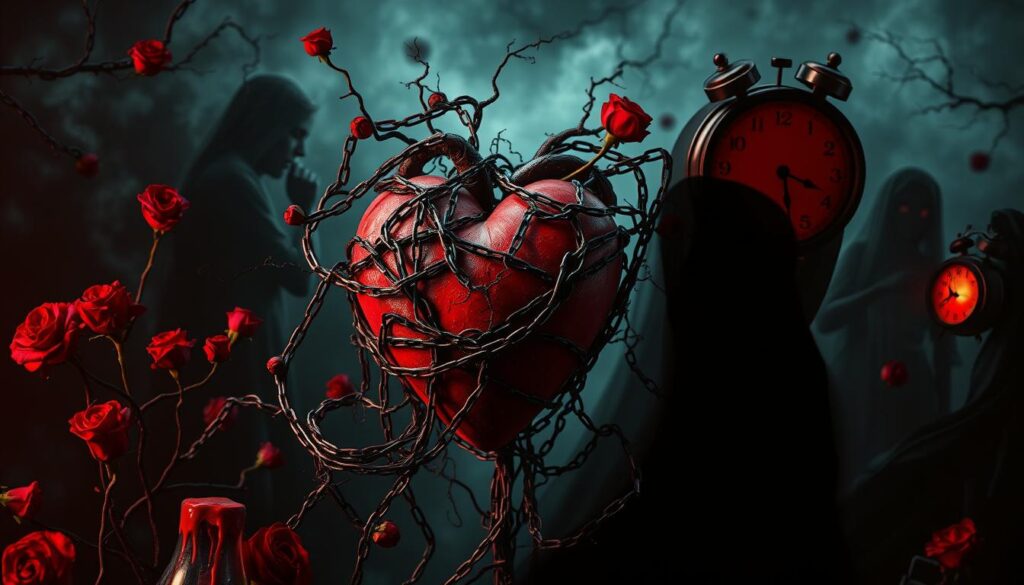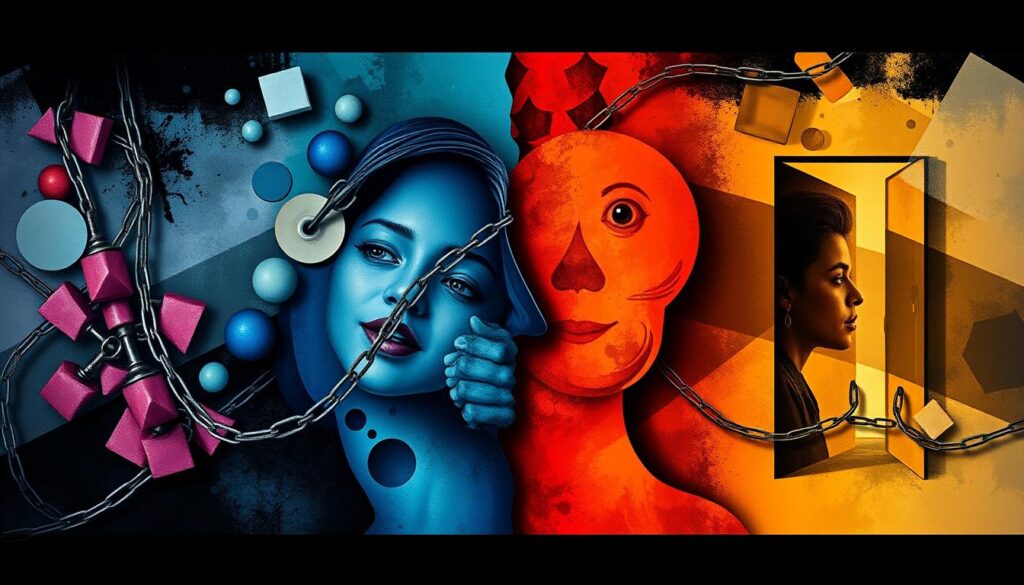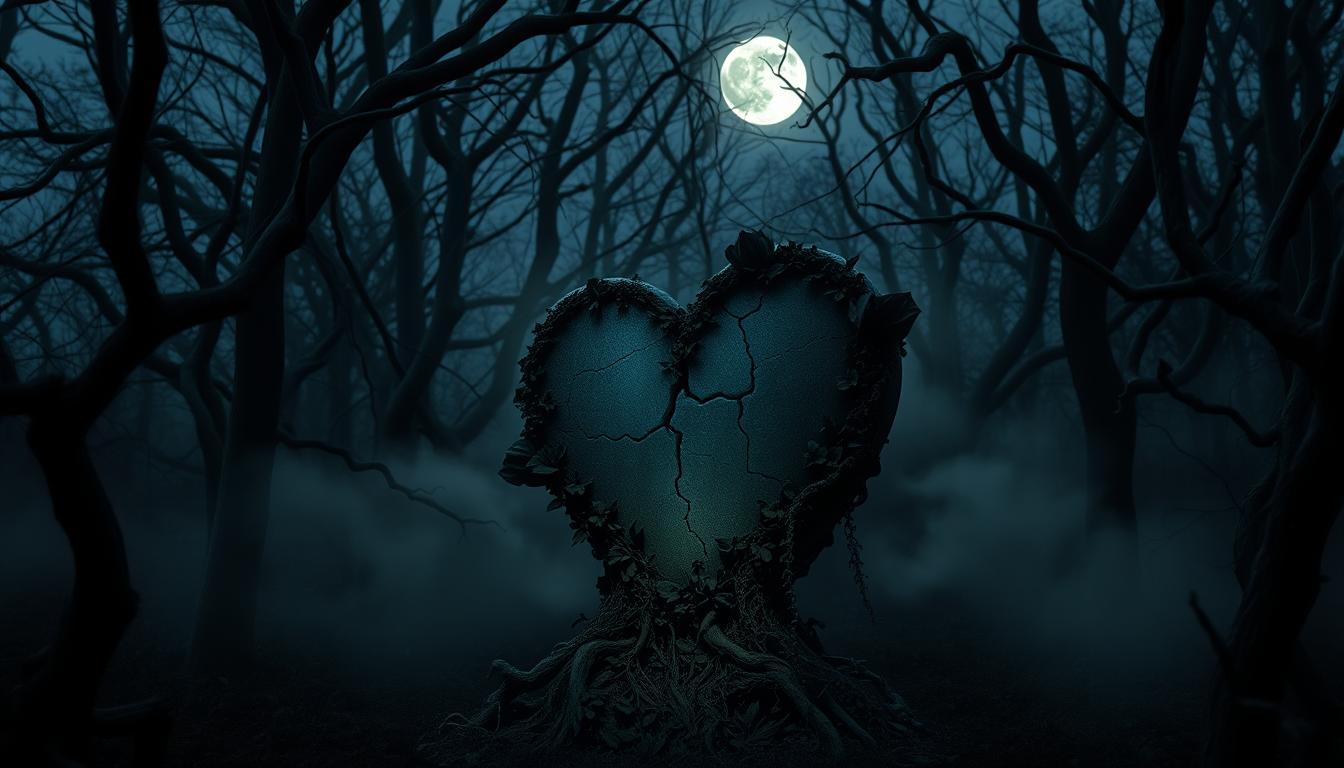Love can be a wild ride, full of ups and downs. In psychological relationships, this ride gets even wilder. Dark romance stories show us the intense love and the turmoil that comes with it.
These stories look into the deep side of love, showing us the hidden parts. They help us understand our own feelings and the complex emotions in love.
Let’s dive into the dark side of love together. We’ll see the power of intense passion, how past hurts affect us, and the line between love and obsession. Join us as we explore the deep side of love and why we seek it, even when it’s hard.
The Allure of Dark Romance in Literature
Dark romance has been a hit with readers for ages. It mixes love with mystery and danger. This style started with Gothic literature in the late 1700s.
Gothic novels set the stage for exploring deep emotions and forbidden desires. They did this against spooky backdrops.
Historical Roots of Psychological Romance
The Brontë sisters were key in shaping psychological romance. Emily Brontë’s “Wuthering Heights” showed passionate, destructive love. Charlotte Brontë’s “Jane Eyre” looked at power in relationships.
Popular Authors in the Genre
Edgar Allan Poe was a master of psychological horror and romance. His stories often had doomed lovers and haunting obsessions. Modern writers like Gillian Flynn follow this path.
They mix romantic suspense with deep character stories. Their works keep readers hooked, diving into human emotions.
Key Elements of Dark Romance Narratives
Dark romance stories are known for intense passion and moral gray areas. Characters face inner struggles and tough relationships. Settings are key, adding atmosphere and tension.
These elements make for thrilling stories. They explore the darker sides of human feelings.
Understanding the Psychology Behind Emotional Turmoil in Relationships
Emotional turmoil in relationships comes from deep psychological reasons. Attachment theory helps explain why some people find it hard to be close to others. Our early life shapes how we connect with people as adults.
Those with a secure attachment tend to have better relationships. But, those with anxious or avoidant styles might face more problems.
Cognitive dissonance often causes fights in relationships. It happens when our beliefs don’t match our actions or experiences. For instance, someone might stay in a bad relationship because it doesn’t fit their self-image.
This inner conflict can cause stress and upset feelings.
Emotional regulation is also important in relationships. People who can’t control their emotions might get upset over small things. This can start a cycle of conflict.
Learning to handle emotions better can make relationships happier and more stable.
Knowing about these psychological ideas can help us deal with love’s challenges. By understanding our attachment styles, facing cognitive dissonance, and improving emotional control, we can create stronger, more rewarding relationships.
The Role of Trauma in Shaping Romantic Behavior
Trauma deeply affects our hearts and minds, changing how we see love and relationships. Early life experiences can shape our adult emotional patterns. These experiences can make it hard to trust and form close bonds with others.
Childhood Experiences and Adult Relationships
Children who were neglected or abused may carry these scars into adulthood. They might find it hard to be close to others or seek unhealthy relationships. This can lead to trauma-bonding, where they form strong bonds with those who hurt them.
PTSD and Its Impact on Intimacy
PTSD can make it tough to connect with partners. People with PTSD might have flashbacks, feel numb, or get very anxious during intimate times. These feelings can push partners apart and make it hard to get close.
Healing from Past Wounds in Love
Healing from trauma takes time and support. Therapy can help people deal with their past and form better relationships. Learning to be aware of yourself, communicate well, and set boundaries is crucial. With effort, it’s possible to build loving, secure relationships even with a history of trauma.
Toxic Love: When Passion Turns Destructive
Love can be very exciting, but it can also turn dark. Toxic relationships start with strong passion but hide problems. It’s hard to see the red flags at first.
Codependency is common in these relationships. It makes people depend too much on each other. This can make the relationship unhealthy.
Emotional abuse is a big sign of toxic love. It can be constant criticism, manipulation, or control. People in these situations often feel confused, anxious, and doubt themselves.
Gaslighting is a tactic used to make someone question their reality. It’s a way to control and confuse.
It’s important to know if your relationship is healthy. Do you feel good or drained around your partner? Are your needs ignored? Does your partner respect your boundaries?
These questions can help spot problems. Breaking free from toxic love is hard, but it’s doable. Get help from friends, family, or experts.
Healthy love makes you feel safe, respected, and valued. Don’t accept anything less than you deserve.
The Fine Line Between Intense Love and Obsession
Love can be very strong, but it can also be dangerous when it turns into obsession. It’s hard to tell when love becomes too much. This can lead to love addiction or erotomania.
Signs of Unhealthy Attachment
It’s important to know the signs of obsessive love. These include always thinking about someone, feeling extreme jealousy, and stalking. People with unhealthy attachments often have trouble respecting their partner’s space.

Psychological Factors Behind Obsessive Love
Several things can make someone fall into obsessive love. Low self-esteem, fear of being left, and past traumas are common. Mental health issues like borderline personality disorder or obsessive-compulsive disorder can also play a part.
Breaking Free from Obsessive Patterns
To overcome love addiction and obsessive behaviors, you need to know yourself and might need professional help. Therapy can help find the reasons behind these behaviors. It teaches how to build self-esteem, set limits, and communicate better.
Navigating Power Dynamics in Intense Relationships
Power dynamics are key in intense relationships. Control issues often come up when partners fight for dominance. This can make one person feel they must submit to keep peace.
In psychological romance, control can be subtle. A partner might control emotions or decisions, leading to dominance. This can hurt trust and freedom. Spotting these signs is the first step to fixing them.
Submission in relationships isn’t always bad. Some couples enjoy consensual power exchanges. The important thing is that both feel respected and valued. But, if submission comes from fear or force, it’s bad for the relationship.
To have equal relationships, talk openly and respect each other. Discuss needs and boundaries clearly. This way, both feel heard and powerful. Together, couples can avoid unhealthy control.
Getting help from a professional can be good for couples with power issues. A therapist can offer ways to deal with these complex issues. They can help find harmful patterns and suggest ways for a fairer relationship.
The Addictive Nature of Tumultuous Romance
Love can be very exciting, especially when it has ups and downs. The mix of emotions in a dramatic romance can make it hard to stay away. This feeling comes from our brain’s chemistry, making some people want the highs and lows of intense relationships.
Neurochemistry of Passionate Love
Passionate love makes our brains release special chemicals. Dopamine, the happy chemical, goes up when we’re in love. Oxytocin, called the “love hormone,” helps us bond. Together, they create a rush of excitement that can be addictive, leading to a cycle of addiction in relationships.
Seeking Drama in Relationships
Some people look for dramatic relationships on purpose. The ups and downs give them a constant thrill. This often comes from past experiences or a need for strong emotional feelings. The rush from fights and makeups becomes a craving, making unhealthy patterns stronger.
Breaking the Cycle
To get out of addictive love patterns, you need to be aware and make an effort. Knowing the signs of relationship addiction is the first step. Look for healthier ways to feel excitement and connection. Aim for stable, caring relationships that offer steady support, not just intense highs and lows.
Love’s Dark Side: Exploring Emotional Turmoil in Psychological Romance
Psychological romance shows the darker side of love. It’s a world where emotions are unstable. Couples face mood swings that can change a calm moment to chaos quickly.
Fear of being left alone is common in these relationships. This fear can make people clingy or push them away. It creates a cycle of push-pull that’s hard to break.
Managing emotions is a daily battle for those in love this way. Even small fights can turn into big problems because of heightened sensitivity. Partners often feel like they’re walking on eggshells, never knowing what will set off the next big emotional reaction.
Despite the challenges, many are drawn to the intense feelings of psychological romance. The good times can feel incredibly special, creating a deep connection. But the bad times can be very hard, leaving both partners feeling drained. To get through this, patience, understanding, and sometimes professional help are needed to build better ways of interacting.
Jealousy and Possessiveness: The Shadow Side of Devotion
Jealousy and possessiveness often hide in romantic relationships. These feelings come from deep insecurity and fear of losing someone we love. While a little jealousy can be nice, too much can choke love and destroy trust.
Insecurity makes jealousy worse, making people doubt their value and their partner’s love. This can lead to controlling actions, endless questions, and trying to limit freedom. Such actions can push partners away and make fears worse.
Trust issues are key in jealousy. Past hurts or childhood experiences can make it hard to trust. This can show as constant doubt, snooping, or needing constant reassurance.
Romantic rivalry can also spark jealousy. The fear of being replaced or outdone can cause irrational thoughts and actions. This competitive feeling can make the relationship tense and strained.
To beat jealousy and possessiveness, people need to boost their self-esteem and face their insecurities. Talking openly, setting clear limits, and building trust are key to a better relationship. With hard work and understanding, couples can turn jealousy into a chance for growth and closer connection.
The Impact of Childhood Attachment Styles on Adult Relationships
Our early experiences shape how we connect with others. Attachment theory explains this link between childhood bonds and adult relationships. Let’s explore how our past influences our present connections.
Secure vs. Insecure Attachment
Secure attachment forms when caregivers respond consistently to a child’s needs. These individuals often have healthy adult relationships. In contrast, insecure attachment can lead to anxious attachment or avoidant attachment patterns.
People with anxious attachment fear abandonment. Those with avoidant attachment struggle with intimacy.

Recognizing Your Attachment Style
Understanding your attachment style is key to improving relationships. Do you worry excessively about your partner’s feelings? You might have anxious attachment.
Do you find it hard to depend on others? This could indicate avoidant attachment. Recognizing these patterns is the first step toward change.
Strategies for Developing Healthier Attachments
Improving your attachment style is possible. Start by practicing self-awareness and open communication. Seek therapy to work through past traumas.
Learn to set boundaries and express your needs clearly. With time and effort, you can develop more secure attachment patterns. Enjoy healthier, more fulfilling relationships.
Betrayal and Trust Issues in Psychological Romance
Betrayal can break the heart of a psychological romance. Infidelity, whether it’s physical or emotional, leaves deep wounds. These wounds are hard to heal.
When trust is broken, everything changes. The relationship feels different, filled with pain and doubt.
Emotional cheating is just as bad as physical affairs. It’s when someone forms close bonds with someone else, sharing secrets. This can hurt trust as much as cheating.
Fixing trust after betrayal is hard. It takes both partners working together and sometimes, help from a professional. The hurt partner must deal with anger and sadness. The cheater must show real regret and change their ways.
But, some couples do get through it. They learn to talk more, set clear rules, and focus on feeling close. It’s a long journey, but many say it’s worth it to keep their love alive.
The Healing Power of Self-Love in Overcoming Relationship Turmoil
Self-love is key in dealing with relationship ups and downs. It helps us handle emotional challenges better. It also makes our connections with partners healthier.
Building self-esteem starts with knowing our worth, not just in relationships. We set boundaries, take care of ourselves, and do things that make us happy. This way, we grow personally and don’t need others to feel good about ourselves.
Being emotionally independent is a big part of self-love. It lets us keep our own identity in a relationship. This way, we avoid losing ourselves in our partners. We also add more depth to our love lives by having our own interests and friends.
Self-love gives us the courage to speak up and stand for ourselves. This confidence stops toxic patterns and builds respect in relationships. The best love is built on two people who are sure of themselves and keep growing together.
Balancing Passion and Stability in Long-Term Relationships
Long-term commitment is all about finding the right mix of passion and stability. Couples who get this right build strong, loving bonds. They keep their relationship exciting and secure, making it last forever.
Keeping the Spark Alive
Keeping the spark doesn’t mean always being dramatic. It’s about sharing new experiences and adventures. Try surprise dates, new activities, or revisiting special places.
Building Emotional Intimacy
Emotional closeness is key to a strong bond. Listen well and be open. Share your dreams, fears, and daily life. This builds a deep connection that keeps your love strong.
Creating a Lasting Love Story
A lasting love story mixes passion with respect and shared dreams. Set goals together and celebrate your wins. Support each other’s growth and keep your love alive. This way, your love story will always be exciting and fulfilling.
When to Seek Professional Help for Relationship Issues
Relationships can be complex. Sometimes, it’s hard to know when to seek help. If you’re struggling with conflicts, communication problems, or feeling distant, it’s time to consider professional support.
Couples therapy offers a safe space to address these issues. It helps you work towards healing together.
Individual counseling is great for those facing personal challenges that affect their relationships. It lets you explore your emotions, past, and behaviors. This self-awareness can lead to positive changes in your romantic life.
Relationship coaching is another option for couples. A coach helps you set goals, develop new skills, and navigate love’s complexities. This approach focuses on practical strategies for improving intimacy and solving conflicts.
Don’t wait until your relationship is in crisis to seek help. Early intervention through couples therapy, individual counseling, or relationship coaching can prevent big problems. Remember, seeking professional support is a sign of strength and commitment to your relationship’s health and longevity.
Conclusion: Embracing the Complexity of Love
Love’s journey is full of ups and downs. We’ve seen how deep relationships can be. Knowing ourselves is key to growing and connecting deeply.
Love has both good and bad sides. It’s about understanding that love and conflict are together. Finding balance and talking openly helps us grow closer.
Every love story is different. What works for one couple might not work for another. Growing together and understanding each other is important for a lasting bond.
Love’s complexity makes it special and worth it. It makes us better and connects us deeply. Embracing love’s journey leads to a bright future.



